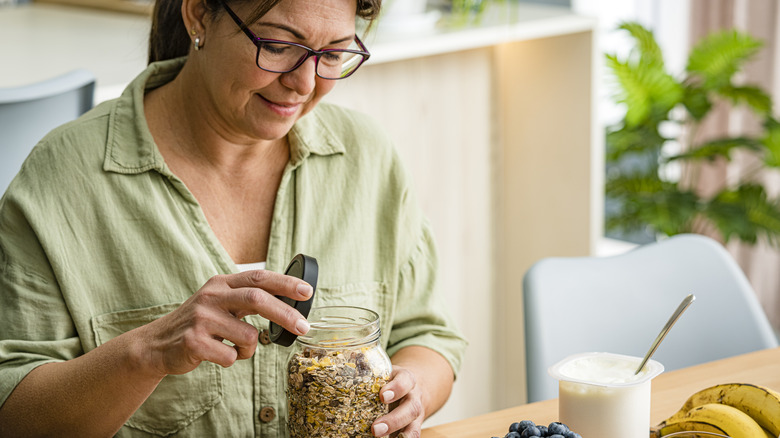Our Gastroenterologists Share The Best 3 Foods To Reach For To Poop Instantly
On days when constipation just won't quit, wouldn't it be great if we could just reach over, press a "poop button" and, presto, constipation be gone! In lieu of a button, Health Digest spoke with two esteemed gastroenterologists who shed some light on what kinds of foods and beverages can help get things moving again — and fast.
While there's no one-size-fits-all dietary solution for constipation, Dr. Mary Ann Y. Huang, a gastroenterologist and transplant hepatologist with Peak Gastroenterology Associates at AdventHealth Parker, told us in an exclusive interview that water, caffeine, and foods high in fiber are three good places to start. "If you are looking for specific foods, prunes, fruit with skins, and avocados can help," she said.
Dr. Huang went on to explain what each of these foods brings to the table in support of our gastrointestinal health. "Prunes contain sorbitol along with having high fiber content," she stated. "Fruit, such as apples, pears, kiwi, and oranges contain fiber, pectin, sorbitol, flavonol, and can also stimulate the GI tract. Avocados contain magnesium which can help relieve constipation." And finally, our personal favorite: a cup of joe. "Coffee contains caffeine which stimulates the GI tract," Dr. Huang explained.
How much fiber we should be getting each day
In our exclusive interview, Dr. Irteza Inayat, a gastroenterologist and Digestive Health Institute Medical Director at AdventHealth Central Florida Division, reinforced much of Dr. Huang's advice. "Eating a diet rich in fruits and vegetables is key for prompt bowel movements due to their high fiber content," Dr. Inayat told us. Offering his own specific food suggestions, Dr. Inayat encouraged the consumption of artichokes, dates, broccoli, chickpeas, pumpkin, whole-grain crackers, brown rice, almonds, peanuts, sunflower seeds, and many more.
"The efficacy of these foods in promoting bowel movements lies in their high fiber content," Dr. Inayat explained. Yet fiber often gets overlooked when it comes to diet. "The typical American diet falls short in fiber, averaging 10-15 grams daily, whereas the recommended intake is 20-35 grams," he said, emphasizing the importance of both soluble fiber and insoluble fiber. "Soluble fiber, sourced from brans, fruit, oatmeal, oat bran, psyllium, and vegetables, helps in water retention in the stool, making it easier to pass," he stated. "Insoluble fiber, which is found in cereals, wheat bran, and whole grains, aids in adding bulk to stool."
Other habits can people use to help keep poop moving
In closing our interview, we asked Dr. Huang and Dr. Inayat about other lifestyle habits people can implement to keep their gut operating at peak performance. Dr. Huang suggested staying adequately hydrated, keeping stress levels low, prioritizing sleep, getting regular exercise, and keeping processed foods to a minimum.
Dr. Inayat noted that we also want to be mindful about the manner in which we eat our food. "Introduce dietary fiber from a mix of sources gradually to your diet," he stated. "Stick to a consistent meal schedule [and] ensure thorough chewing of food." Echoing Dr. Huang's recommendations about drinking plenty of water, Dr. Inayat added that soups, broth, and juices can also serve as hydrating dietary sources. Finally, we want to pay attention to what our body is telling us. "Heed the natural urges for bowel movements without delay," Dr. Inayat advised. In other words, we don't want to make a habit of holding in our poop. "Avoid exerting too much pressure during bowel movements to prevent strain," Dr. Inayat concluded.



